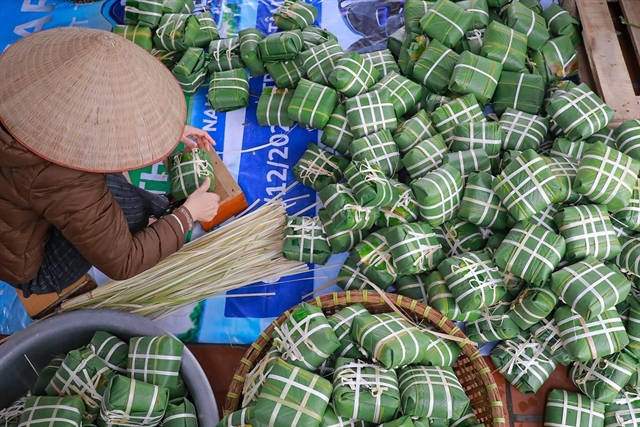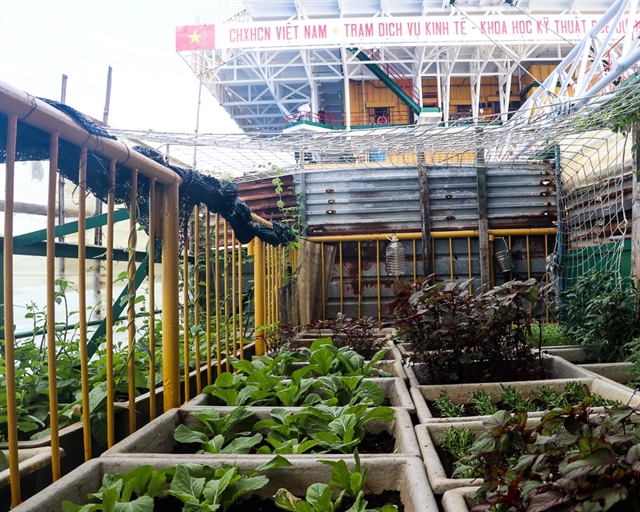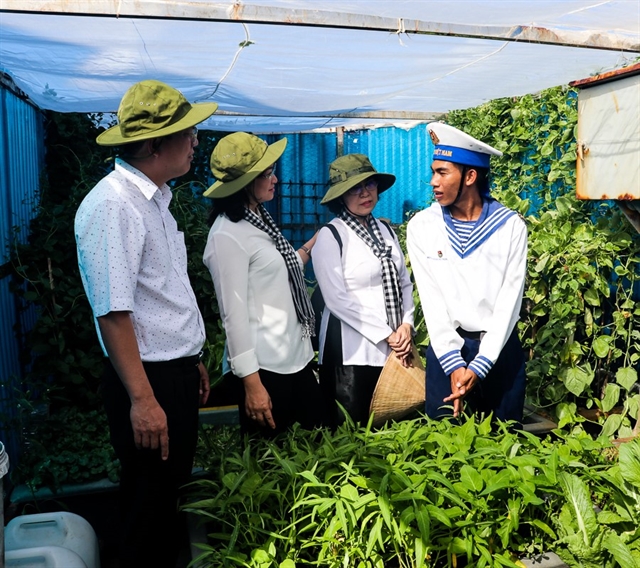 Society
Society

Growing vegetables on the Trường Sa (Sparatly) Islands is no easy task. Harsh weather conditions make it difficult to farm, so soldiers living their need will, determination, and plenty of patience.

|
| Vegetable pots are on the DK1/8 rig house located on Quế Đường sandbar. VNA/VNS Photo |
TRƯỜNG SA ISLAND — Growing vegetables on the Trường Sa (Sparatly) Islands is no easy task.
Harsh weather conditions make it difficult to farm, so soldiers living there need will, determination, and plenty of patience.
On Đá Nam Island, there is a 50sq.m vegetable garden with a wide variety of plants, ensuring enough vegetables for soldiers' meals.
Soldiers needed to build strong rigs to protect the vegetables from the sea wind and set up a small trellis to protect each vegetable bed.
Captain Trần Thế Tài, commissar of Đá Nam Island, said that living and working on the Trường Sa (Spratly) Islands for many years helped him fully understand the values and efforts that soldiers made to grow vegetables.
Tài said that for newly-planted vegetables, although the garden was covered carefully against wind, they still had to construct tents for further protection.
"Without the tents, the vegetables will be exposed to sunlight and sea breeze carrying salty water, which can cause the vegetables to die," he said.
In the past, Trường Sa usually faced a shortage of fresh water for the vegetables but now they have a system in place to purify seawater into brackish water.

|
| Soldier Hồ Xuân Ninh (right) of Đá Nam Island said that when he first got to the island, he was surprised by the amount of vegetables. VNA/VNS Photo |
Soldier Lê Tôn Trang of Thuyền Chài B Island said they also save rainwater to water vegetables.
"If collected rainwater is not enough for vegetables, we will use purified seawater," he said.
"Shielding from the sea breeze is also an art," he said, adding that the work was like taking care of a baby.
"Forgetting to cover the vegetables for just one night, we will lose all the vegetables by the following day as they will wither and fade away. Therefore, to grow vegetables, officers and soldiers must grasp the changes of the weather and climate.
"People are assigned to cover the vegetable garden in the right direction, every day according to the wind to make sure the vegetables survive."
Colonel Hòang Thanh Tứ, leader of Song Tử Tây Island said that at the end of the year, the sea breeze was very strong.
"One day, if you forget to close the door of the vegetable garden, the wind may come in and kill them all," he said.
Today, on sunken islands, an incremental garden system has now been built and scientifically planned. Diversified types of composite pots and soil are transported from the mainland to the islands.
All kinds of vegetables are grown as well as fruits and herbs such as Vietnamese rau muống (morning glory), rau cải (mustard spinach), mồng tơi (malabar spinach), rau đay (jute), rau dền (red amaranth), rau ngót (sweet leaves) and some herbs which are suited to harsh weather conditions like lemongrass, ginger, chillies, basil, and green onions.
People living on the islands now have enough vegetables for their daily meals.
Currently, on the island points in Trường Sa, local gardens meet 80 per cent of the demand for vegetables. Such results proved that soldiers there accumulated experiencs in selecting and nursing vegetables in changing conditions throughout the year.
To fully make use of the cultivated land, officers and soldiers grow gourds, squash, and melons. Fishermen who work on the sea for a long time sometimes visit the island and ask for vegetables and fresh water.
Soldier Hồ Xuân Ninh, Đá Nam Island said that many people on the mainland thought there were no vegetables on the island.
"When I first got to the island, I was surprised because the island had a lot of green vegetables," he said.
"That is the joint efforts of many soldiers there.”
According to Colonel Nguyễn Thiên Quân, Deputy Commander of Naval Region 4, in recent years, thanks to care from the Party, State and Army, a lot of investment has been made on the islands to increase production from improved research on composite pots to fertilisers, biological products and irrigation systems.
In the submerged islands, there is a rainwater collection system for daily use, so it also improves irrigation, drainage, and vegetable farming, he said. VNS




